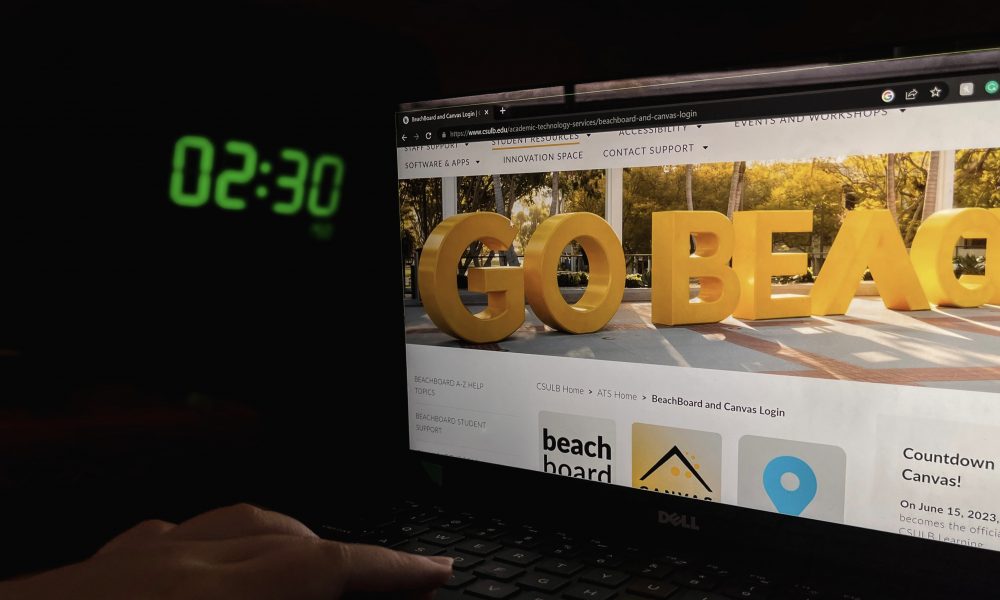When COVID hit in 2020, international student Chiara Grandin was awake from 2:30 a.m. to 7 a.m. every Tuesday to attend her online class discussions after she returned to Venice, Italy.
When the pandemic forced students to integrate an academic lifestyle into their own homes, international students had to adapt to a new normal as they continued their studies abroad.
“Since I had a nine-hour difference, every class I had was basically late evening or during the night for me,” Grandin said. “It was all about adjusting and trying to sleep during the day to stay focused at night.”
In July 2020, the U.S. Immigration and Customs Enforcement stated in a news release that students on an F-1 visa (which permits them to reside in the U.S. as full-time students) could not remain in the U.S. if they were taking a fully online course load.
Since CSULB moved classes to fully online in March 2020, most international students like Grandin and graduate student Shinichi Tataka had to return to their home countries.
Tataka was in his last semester to obtain a master’s degree in linguistics when COVID struck. Given the 17-hour difference between Tokyo and California, he said he knew the adjustment would be no easy feat.
Campus staff, such as Zaheer Ahmed from the English as a Second Language Writing and Tutoring Center, wanted to remain a valuable resource to students despite the distance.
Ahmed was scheduled to be on campus on Thursdays from noon to 1 p.m., but on Saturdays at 9 p.m. during the pandemic, he started logging onto his personal computer to tutor Tataka where it was 1 p.m. in Japan.
“I wanted to keep in connection, keeping myself open to helping,” Ahmed said.
There were approximately 2,400 international students who attended CSULB in 2020, according to College Factual, which is about 6% of the student body population.
Differences in time zones and having no access to in-person resources became an obstacle to their college experience, but Tataka and Grandin said professors remained flexible.
“Some of them allowed me to skip part of the classes from time to time or gave me extensions for my papers,” Grandin said.
The International Students and Scholars Services became another valuable resource to international students, which offered virtual accommodations including immigration advising, digital access and support outside scheduled hours.
Eugenia Kim, director of the International Students and Scholars Services, said that the best way to adjust to COVID involved extending help in different areas and being flexible with the students’ time.
Fortunately in 2019, Kim had already started moving some services online since the long-distance commute to Long Beach and long waiting lines became an issue for students.
“Obviously COVID sort of accelerated the availability and the process of that, so I’m happy to say we were, in some ways without knowing it, kind of ready,” Kim said.
Because of stay-at-home rules, only one staff member from ISS would come in every day in case there were still visiting students, while the rest of the staff who conducted services online worked around the clock as needed.
“In time students had emergencies, [we had] staff at one in the morning answering emails, so I think it was difficult for everybody,” Kim said.
Most international students like Tataka also never heard of Zoom prior to March 2020, and thus faced challenges of learning the new technology – something staff members like Ahmed also grappled with.
“I would have been very happy if they offered technology class or hands-on workshops because I was very new. I’m not familiar with the culture and I didn’t know anything about online connections,” Tataka said.
Kim said international services is working on making their websites and online resources easier to navigate, considering Canvas is also slowly being implemented at CSULB.
Now as most classes return in-person and international students are returning to campus, there are fewer students who seek out time zone accommodations. However, faculty and staff remain open to helping students abroad.
“I wrote a ‘thank you email’ to each professor at the end of my semester abroad,” Grandin said. “I could really feel like they made whatever was in their power to make my end of the semester easier.”




